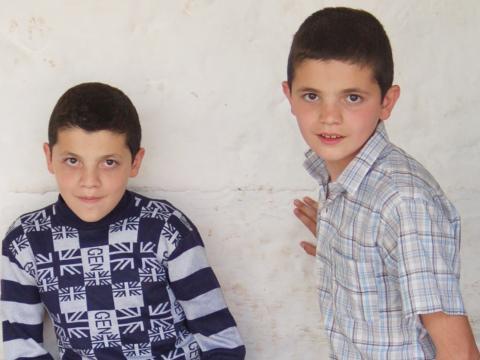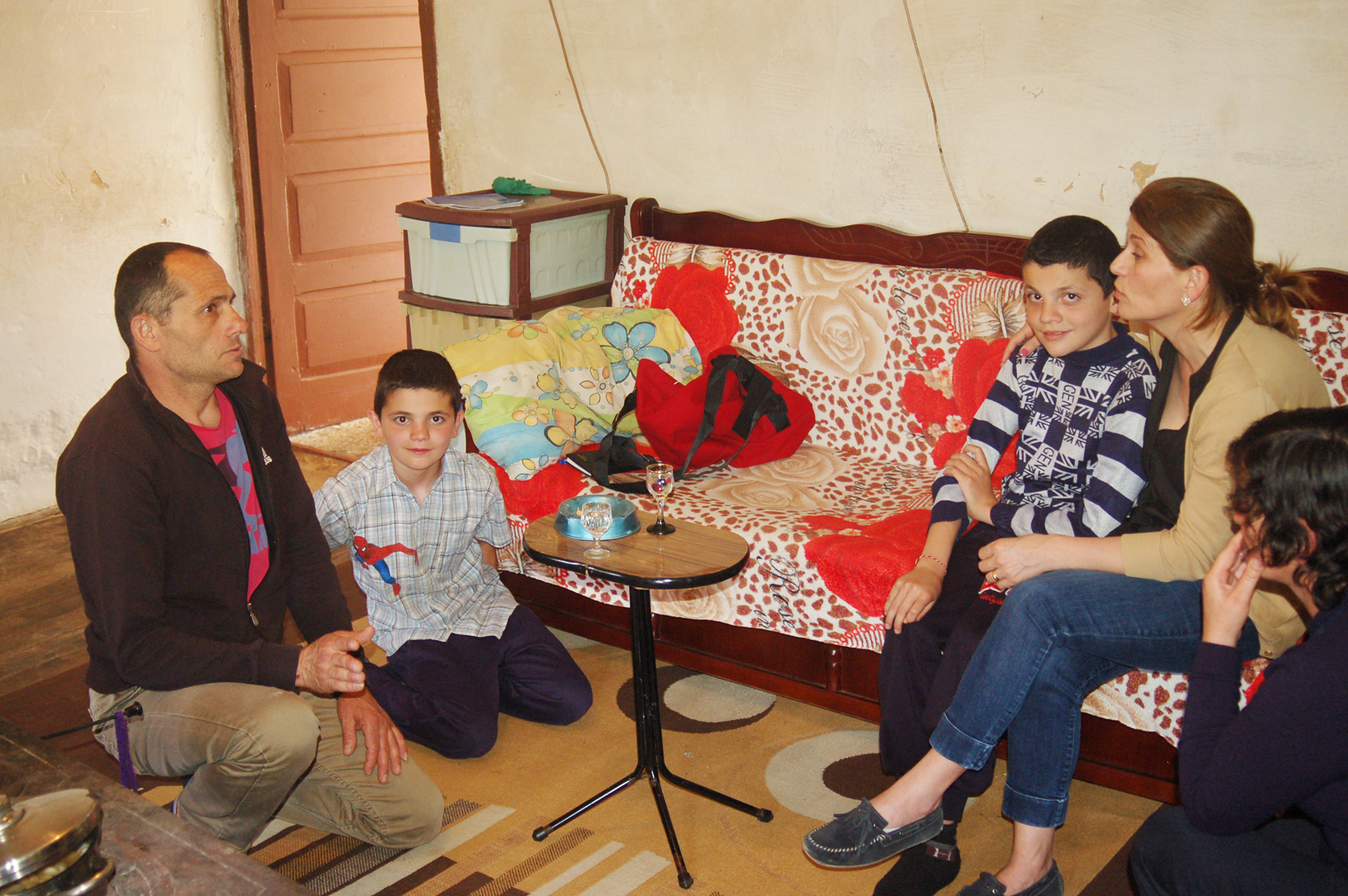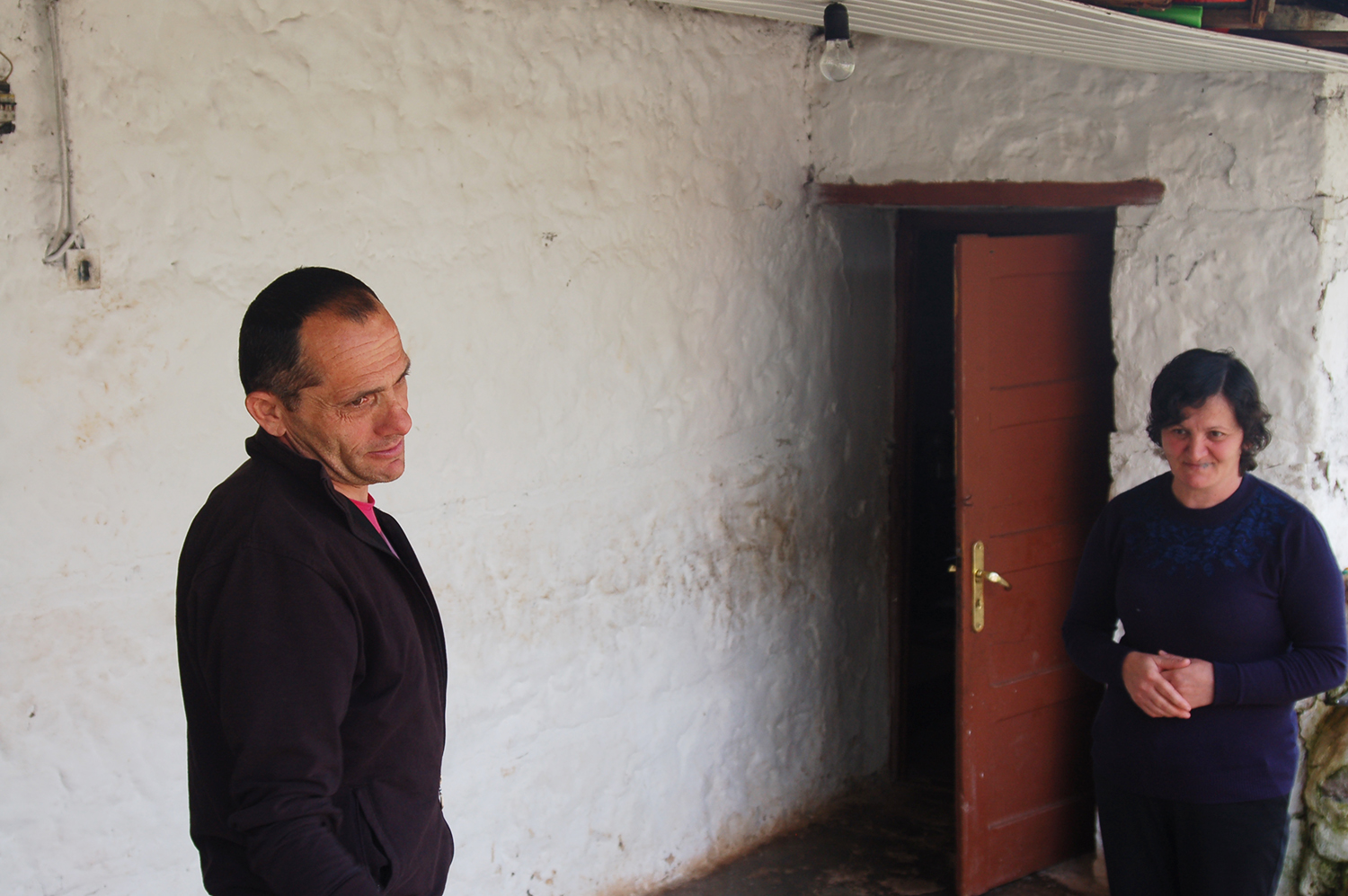Dreams

Fatos Baxhaku – We are on our way to Dragostunja, a village near Librazhd. Near is the precise adverb to use as within minutes we will really see how close we are to where we were headed. We are accompanied by two ladies from World Vision Librazhd, an international humanitarian NGO that is in the forefront of assistance to vulnerable children and farmers who want to move forward with their lives. We know that the key note of this visit will be poverty, but we forget about it for the moment as a lukewarm spring sun falls on the main square of the city. A young girl near us orders: "A cold milk cappuccino, please hurry buddy!" and anxiously picks up her cigarette package. Someone has told her that a cigarette is not good on an empty stomach, and has done well to tell her so.
A bronze bust, with the traditional proud stance of heroes in a semi-profile position, gazes indifferently the passersby who are enjoying the spring too. He is eligible to be proud. The massive bronze bust represents the memory of Gjergj Arianit Komeni, the Arbër braveheart who started the anti-Ottoman uprisings as early as 1433. At that time, Gjergj Kastrioti Skanderbeg, later his son-in-law, was still under Murat II's service. We would have loved to delve more into Arianiti's story, who became more famous under the name of Gjorg Golemi, when professor Dhimitër Shuteriqi gathered his feats past on from generation to generation through the songs sang in these distant mountains of Librazhd, but work is work and we have come here with a different and clear objective. We are here to see what efforts are being made in Librazhd to mitigate the concerns of the most vulnerable people of the society. They are sick and poor children, often times isolated in mountainous abode, and their parents unemployed.
The project that tends to this wound of the society is called with the positive name "Hello". It is among the few greetings in Albanian, which can not be translated literally into foreign languages, as if it came from another time, from a time when people joined hands to face difficulties. "The project Hello "- says Donika Qelemeni, its coordinator in Librazhd - aims to create community groups in order to assist disabled children in the Librazhd and Përrenjas municipalities".
Along with Donika, we leave behind the stately bust of Gjorg Golem and we head for Dragostunja. At the same time, but taking a shorter pedestrian street, Astrit Çela rushes home too. He will soon become one of the protagonists of this story.
We are a little frustrated by the road which our car struggles to cover. It is something between a path, hard pressed dirt, as we swerve between rocks dropped down from slopes and some streams that run through this torn apart street. In some other parts of this road, the road itself is already a memory. As the car is tossed from side to side, groaning, we remember that in these areas Dragostunja is also known as the "village of the Muslim priests". Ylli Gurra, the mufti of Tirana is from here also. When in the endless struggle against poverty, some are not helped by not even Allah himself, then the person looks for other ways. Such was the case of a 24-year-old, whom everyone knew at school, but who later joined ranks with the jihadists in Syria. Only when he was killed in 2014, the village was reminded of the religious Balliu family, who had uprooted itself from there and had settled somewhere in Arabia.
Finally, beneath the lush greenery, we sight the homes of Çela neighborhood. Astriti, the owner of the house, has arrived ahead of us, thanks to the shortcut he took through the pedestrian road. Gasping for breath, he takes us inside. Out in the yard, a soccer ball continues to roll in a sort of stream of water, an indication that someone was playing here up until our arrival. From within, we barely manage to hear distant whisperings. Donika from the World Vision is here as in her own home. We envy her easy going nature as we strive to get used to the environment in which we have just entered. Outside, the midday sun has started to shine brightly whereas inside it is a suffocating heat, mixed with the famous smell of dampness. A wood burning stove thunders in the middle of the room, then we discern Dituria, the mother of the children, and the two brothers, Argjend and Eduart, with smiling faces, but with twisted limbs. Both suffer from dystrophy. Argjend who is 11 is the worse of the two. His brother, 9, sometimes happens to attend school. When it is not raining, or when it is not cold, he starts the laborious way to the seat of knowledge, the school, strolling with difficulties through gaps, shrubs and all kinds of other obstacles. It takes him two hours walk to be able to sit in the classroom with his classmates.
This family is struck right at its heart. As the two brothers play with an electronic toy, a donation by who knows who, Dituria, their mother, shares her story: "I've had a hard life - she starts to talking slowly - I'm from a village in Peshkopia. That is where I got married. I gave birth to a son, Daniel. In Dibër, people work. There is a kind of normal life out there, unlike here. But bad luck had my husband murdered. So I was left alone with my son. Astrit was working in that area, and was courting me, determined get married to me. In brief, I married again and came here to settle. I was surprised here by the neighborhood. There were many sick. People were alone and doing anything. Daniel, my great son, I sent to the orphanage. He grew up there and sometimes would come to visit us in the weekend and that was all from him. He became a handsome young man. Then in Elbasan I gave birth to Argjend. I was shocked. The boy did not walk but dragged himself on the floor like a frog. The knees would hurt him till he bled. This is how he grew up, mostly dragging himself around. Eduart is affected by the same health issue but his situation is somehow better. When we lived in Elbasan, I gave birth to also two daughters. Now they are 10 and 4 years old and grow up in the orphanage in Elbasan, in one of those that the church runs there. They bring them here from time to time and they are a delight to us. They are doing really well at school. They are growing well".
"They are growing well, they are growing well ..." reiterates Dituria with her eyes locked in the falling apart fence that can be seen from beyond the window. Then it starts a long silence. Only the two boys with their twinkling eyes are the spice of the conversation. Like all peers, they admire Messi, Ronaldo. Their dream is to become footballers, even famous ones. One of them proudly presents the soccer ball that was left behind in the water course. His mother drifts away contemplating her fate as she stirs a pot of beans on the stove, the only menu in this house. Then, with her, we take a tour of the house overwhelmed by this great sadness. Neither the sun, nor the lush spring, nor the just blossomed flowers can distract us from the long sigh of Dituria. "Here's the supposedly bedroom - she points to some scary damp marks on the walls - there at the end of the yard is what we call the toilet." We decide that it would be better to satisfy ourselves with a distant look at it. It speaks for itself, there is no need for close up details.
For this Dibra woman, Elbasan is enveloped in a kind of magic. It's as if someone remembers paradise: "In Elbasan we had a house for rent. We were doing well. The girls were close to us. What impressed me was that people treated us well. They use to greet us politely, joked with the kids, the shopkeepers helped us. The boys were taken to the park where they were with their peers. In spite of the many problems, I felt myself a human being. But here ... you can see for yourself. Now I suffer from deep depression, I'm on medication. I have been hospitalized many times. I sometimes feel like I am out of breath, I feel like screaming, screaming so loud that my voice would reach to God Himself. Then I collapse and have no strength for anything. Oh that we were once again in Elbasan ... ".
There is a reason for the proverb: every one has his own issues, or for the other quite interesting saying: two hands are for one head. Probably motivated by this national wisdom, a man appears in the gloomy room. He has a straight face and holds cautiously under his harm a file. "Ah yea, you are the ones of television talk shows – he mumbles - well, thank God you come. We want you to resolve for us the issue with the road. You see for yourself the level of poverty here. We need to live like everyone else. I wanted to go and report this situation to the Fiks-Fare investigation show, but I trust you. Really I have much respect for you." A bit upset, Donika patiently explains that we are not from them and not even from the Albanian Development Fund nor of television talk shows, but we simply came to meet his neighbors that live in a dismal situation. The man with the folder is disappointed and returns to the street, where his great glittering villa can be noted which his son built with the money he earned in emigration. Surely he thought: "Ah, these are the ones who work with the poor. They are good for nothing. " Anyway, he did well to leave, because that way we will have a chance to play some football with the boys. Poor Argjend tries hard to kick the ball his brother generously passes. Argjend wins as he sends the ball in the triangle between the living room and the bedroom. He shrugs his shoulders when we tell him that he has scored a goal just like Ronaldo did against Juventus. I know that it is not true. He is sane, astute, honest in his forgotten situation by that stream of water in Dragostunja. The time has come for us to head back. The boys hug Donika in a way it would make you think she is their oldest sister. So far, only she and her colleagues have shown up in this house full of sufferings.
Astrit, the father of the children and his neighbor, the man who came with that file, benefit from our the open cargo part of our car to hop in and return to Librazhd. Surely they left some important conversation to finish at the café bar there. As we swing through potholes of the Dragostunja road, we see the silhouette of Dituria, standing as if frozen, with her face directed towards heaven, until in a sharp turn we lose sight of her.
Duke shtrënguar disi dhëmbët, Donika i shpjegon me durim se nuk jemi as të Fondit Shqiptar të Zhvillimit dhe as të debateve televizive, porse kemi ardhur thjesht për të takuar fqinjët e tij në fatkeqësi. Njeriu me dosje zhgënjehet ca dhe kthehet në rrugë, atje ku duket vila e tij e madhe vezulluese, të cilën ia ka ndërtuar djali nga emigracioni. Me siguri që ka menduar: “Ah, këta janë ata që merren me të varfrit. Këta nuk e nxjerrin qimen nga qulli”. Gjithsesi ai bëri mirë që iku, sepse kështu do të luajmë pak futboll me djemtë. Argjendi i ngratë bën mund të godasë topin që ia lë me bujari i vëllai. Fiton Argjendi, që e lëshon topin në trekëndëshin mes kuzhinës dhe dhomës së gjumit. Ngre supet kur i themi se ka bërë një gol si Ronaldo kundër Juves. E di edhe vetë që nuk është e vërtetë. Është i kthjellët, i qartë, i ndershëm në dhimbjen e tij të harruar në atë përrua të Dragostunjës. Ka ardhur koha për t’u kthyer. Djemtë përqafojnë Donikën si ta kishin një motër të madhe. Deri më tani vetëm ajo dhe kolegët e saj janë dukur në këtë shtëpi të dhimbjes.
Babai Astrit dhe fqinji, “njeriu me dosje” që tani është pa dosje, përfitojnë nga karroceria e makinës sonë për t’u kthyer në Librazhd. Me siguri kanë lënë ndonjë bisedë me rëndësi për të përfunduar në lokal. Ndërsa kolovitemi sërish në xhadenë e Dragostunjës shohim siluetën e Diturisë, që rri si e ngrirë, me portretin e drejtuar nga qielli, deri sa në një kthesë të fortë na humbet fare nga sytë.

